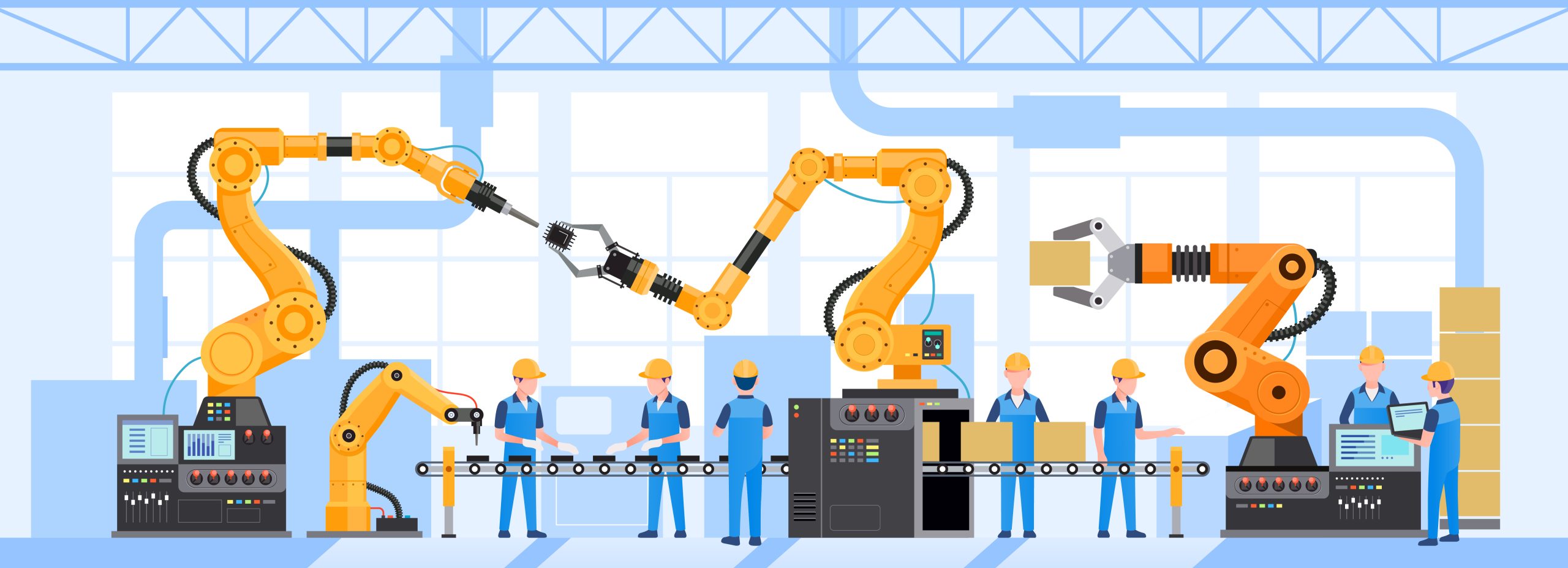


The manufacturing industry is experiencing a rapid transformation, with robotics playing a crucial role in shaping its future. The integration of automation and robotics engineering has led to the development of advanced systems that enhance efficiency, precision, and flexibility in production processes. Let’s explore how robotics has evolved in manufacturing, the advantages of robotic process automation (RPA), and the emerging trends that are redefining the industry.
The integration of robotics in manufacturing began in the 1960s with the introduction of Unimate, the first industrial robot, at a General Motors assembly line. This marked the beginning of automation in manufacturing, enabling machines to perform repetitive tasks with consistent accuracy. Over time, advancements in automation and robotics engineering have led to the development of more sophisticated robots capable of handling complex tasks, thereby increasing productivity and reducing human error.
Robotic process automation in manufacturing utilizes software robots, or ‘bots,’ to automate repetitive, rule-based tasks that are often time-consuming and prone to human error. RPA streamlines operations such as data entry, order processing, inventory management, and compliance reporting. These bots operate 24/7, significantly reducing the time and effort required to complete these processes while minimizing errors.
The implementation of RPA in manufacturing offers numerous benefits of robotic process automation:
Advanced robotics manufacturing, incorporating artificial intelligence (AI) and machine learning, is shaping the future of manufacturing. These technologies enable robots to learn from experience, adapt to new tasks, and make decisions in real-time. For instance, Amazon has invested heavily in developing robotic arms like Robin and Sparrow, which use AI and computer vision to handle various items, significantly increasing warehouse efficiency. This is a prime example of the future technology of robots being implemented today.
Collaborative robots, or “cobots,” are designed to work alongside human workers. Cobots enhance human capabilities by taking over repetitive or physically demanding tasks, allowing workers to focus on more complex and creative aspects of production. This collaboration fosters a more flexible and dynamic manufacturing environment.
While the benefits of robotics in manufacturing are substantial, there are a few challenges that we need to overcome:
The future of robotics in manufacturing points toward increased autonomy, intelligence, and integration. Emerging technologies such as 5G connectivity and quantum computing are expected to further enhance the capabilities of industrial robots, leading to smarter factories and more efficient production lines.
Robotics is poised to revolutionize manufacturing. It’s not just about making things faster; it’s about fostering innovation and creating new products and services. Companies that embrace these advanced technologies will be well-positioned to meet the evolving demands of the global market, ensuring competitiveness and sustainability in the years to come.

Inspired by the tree of knowledge, this logo implies a tree with interspersing dots representing various skills that the institute offers, making it a wholesome skilful tree. The tree’s bark represents individuals with different mindsets coming together with a common purpose of growth. Lastly, one can subtly see the acronym IIS which also represents students as figurines.

To date, we have trained around 650 students. Our alumni are working with notable companies, such as Torrent Power, Powellite Electricals, Tata Motors, Bajaj Auto, and L&T. . Equipped with holistic technical and business skills, many alumni have also chosen the path of entrepreneurship to realise their dreams.
We firmly believe in inclusion. Identifying segments that need us the most is one of our goals. We are mindful of reaching the tribals and marginalised and ensuring maximum women participation.

Learning from the industry is at our core. Our industry partners are deeply involved, right from course design and delivery to recruitment. Our current partners include Fronius, Universal Robots, SMC, Phillips Machine Tools, Multivista, Fanuc, MIR, Markforged, Schneider Electric, Lincoln Welders, Hexagon, Formlabs, ABB, Festo, Ather, Tata Motors, Thermax, Larsen & Toubro, Bajaj Auto Ltd., Carraro, Marriott, Indian Accent, Taj, Lollo Rosso, Tomato’s, Ramada by Wyndham, Novotel, La Milano Pizzeria, Renaissance Hotels, The Fern, Tatr, IFEA, The Job Plus, Happy Faces, Sewa.

The campus is situated on a 4.17-acre land parcel at Chunabhatti inside the National Skill Training Institute campus in the state of Maharashtra. The first phase of development comprises a 22,500-square-foot facility housing advanced manufacturing and electric vehicle laboratories. The facility also includes classrooms and advanced computer laboratories for training in allied areas, providing trainees with a real-world environment akin to working in the manufacturing industry. It is equipped to train approximately 190 students at a time.
Spanning over 2.5 lakh square feet, the campus features infrastructure that includes training facilities, hostels, and dedicated spaces for student activities, supporting comprehensive learning and growth.